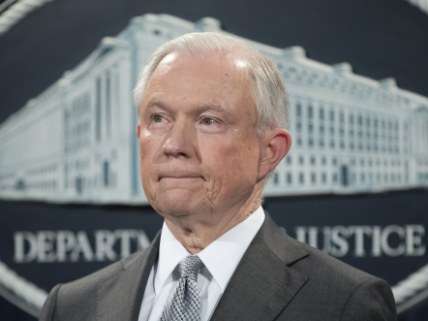A.G. Sessions Admits Feds Can't Make Sanctuary Cities Help Deport Immigrants
Executive order scaled back in attempt to satisfy courts.

Rejoice, conservatives: Federalism has been affirmed! The Department of Justice and Department of Homeland Security (DHS) have admitted that they can't force local police to enforce certain federal laws.
Perhaps not all who self-identify as conservatives will be cheering this news. Yesterday afternoon, Attorney General Jeff Sessions put out a memo acknowledging that President Donald Trump and his administration generally lack the authority to punish so-called sanctuary cities by denying them federal grants.
Quick background: Trump campaigned on the promise that as president he would crack down on sanctuary cities, municipalities where authorities generally don't check whether the people who end up in custody or seek government assistance are in the country legally.
The conflict: State, county, and municipal governments are under no obligation to help the feds deport illegal immigrants. Immigration and Customs Enforcement (ICE) officials can send local police and jails "detainer" requests asking them to hold on to a deportable immigrant. But this is a request, not a legal order. Cities have developed their own guidelines determining how to respond: Some cooperate, some require warrants or court orders, and some cooperate only if the immigrant has been charged or convicted of serious crimes. The rules vary.
In January, Trump signed an executive order threatening to cut off many federal grants to sanctuary cities on the order of the attorney general or secretary of DHS.
There is one part of the federal code that does overrule state and municipal regulations in relationship with immigration enforcement. 8 U.S.C. 1373 forbids local governments from implementing policies or regulations that would inhibit communication between local police and federal agencies about a person's immigration status. That's it. It doesn't require that local police even check an immigrant's citizenship status in the first place. But if an officer knows that somebody is in the country illegally, a city (or county, or state) can't stop that officer from informing ICE if the officer wants to do so.
It turns out most sanctuary cities are in full compliance with federal law. When the Department of Justice started sending threatening letters to enforce the executive order, only eight municipalities and one county received them. (Granted, the list includes such major cities as New York, Chicago, and Miami.) What Sessions was demanding was that these places prove they're in compliance with 8 U.S.C. 1373.
In April a federal judge put Trump's executive order on ice for now. The federal government cannot order the police in cities to simply do their bidding and use grant money as a general bludgeon to coerce compliance. Sessions' memo yesterday acknowledges the limits of federal authority here while looking for a way to salvage the executive order. The memo states that the order is merely meant to make sure that cities are in compliance with 8 U.S.C. 1373 (which, again, is just about communication), and it clarifies that the only grants the government would attempt to withhold from noncompliant cities would be those from the Justice Department and DHS, not any other federal agencies.
The Sessions memo also states that the vague term "sanctuary jurisdiction" refers just to cities that refuse to comply with 8 U.S.C. 1373. That means that according to the Department of Justice, Los Angeles—which generally doesn't check to see whether its citizens are in the country legally or illegally—is not a sanctuary city. Remember ICE's March report listing crimes committed by illegal immigrants in various sanctuary cities and counties? Many of those cities and counties no longer qualify as sanctuary jurisdictions under the Justice Department's definition.
This doesn't mean Trump or Sessions still won't still refer to these communities as sanctuary cities for political purposes. But based on Sessions' own memos, there are only nine sanctuary jurisdictions in the whole country.
That's how things stand at the moment, anyway. The Sessions memo notes that future statutes could allow the Justice Department to attach new strings to grants. He could be referring to a bill introduced by a pack of Republican lawmakers last week that would expand 8 U.S.C. 1373 and the potential for the departments of justice and homeland security to control federal grant funding. Under the Davis-Oliver Act, cities would be forbidden from implementing regulations or ordinances that keep local police from complying with ICE detainer requests—and local jurisdictions that decide otherwise risk losing any federal grants related to law enforcement and fighting terrorism. (Read more about that proposal here.) If it's passed, the list of places that actually count as sanctuary cities would undoubtedly increase dramatically.
In the meantime, the Trump budget released today calls for dramatic increases in immigration control: 500 new border patrol agents, 1,000 new ICE officers, 75 new immigration judge teams, $1.5 billion more for detaining and deporting illegal immigrants, and $84 million more for increases in federal detentions.


Show Comments (16)